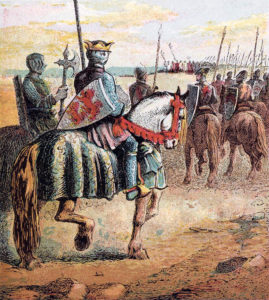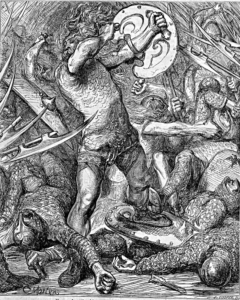
One can only imagine the chaos at the end of October, 1066. But it’s apparent the English weren’t ready to accept William as their king just because he won the Battle of Hastings. As soon as word spread of the terrible battle, men started gathering at London—so many men that an assembly was called to elect a new king. It was said that Edwin and Morcar, heirs to Leofric of Mercia, immediately put themselves forward—one or the other—as candidates. However, they could not muster any support, so instead they agreed to endorse Eadgar Aetheling, the last direct descendant of a reigning English king.
As everyone knew, poor Eadgar had no experience in government and little influence due to his youth and foreignness; he had grown up in Hungary. He needed some leadership to prop him up, but it seems that Edwin and Morcar had a change of heart, for it is said they withdrew with their troops back to Northumbria. When William approached London, ravaging the country as he passed, all resistance collapsed and Eadgar was dropped like a proverbial “hot potato”.
Edwin and Morcar were not present at William’s coronation, but they soon presented themselves to the new king at Barking, just outside the city, along with other missing chieftains. William received their submission, and for the moment Northumbria was left undisturbed. Edwin and Morcar accompanied the king on his visit back to Normandy in 1067, presumably as hostages along with earl Waltheof (son of Earl Siward), Eadgar Aetheling, Archbishop Stigand, and other Englishmen who could be considered dangerous if left to their own devices. Well over a year passed thus, with the northern earls held in uneasy captivity while the Northumbrians collaborated back at home, content under their native chieftains. Apparently Edwin won the favor of William, who is said to have offered one of his daughters to the earl in marriage (it may have been a love match), though the king never delivered on his promise. At the same time, William was partitioning off pieces of Mercia for his own followers. These slights antagonized Edwin, and in short order the brothers rose in rebellion, joined by Eadgar Aetheling. They had been present at Matilda’s coronation at Westminster on Easter, 1068, so presumably they must have bolted at the first opportunity.
However, William was at the top of his form and he was soon marching north with a large army, building castles as he went. By the time he got to Warwick, Edwin and Morcar were ready to surrender and York quickly followed, offering William the keys to the city and submitting to a new castle right in their midst. Apparently the two earls remained as William’s “hangers-on” during the next Northumbrian rebellion (after which William built a second castle in York) and the last great revolt (with Eadgar Aetheling and the Danes), for they took no part in the uprisings. For all intents and purposes, their influence in the north was at an end, even though they retained their titles. Did they accompany William during the Harrying of the North? History is silent on this question.

Finally, in 1071, Edwin and Morcar apparently mustered a last bit of courage (or desperation), for somewhere around April they escaped from William’s court and attempted to raise another rebellion. Historian Marc Morris tells us: “It soon became apparent, however, just how far their fortunes had sunk, for it seems that no one rallied to their cause.” (The Norman Conquest). They wandered around for a while before parting company. Edwin supposedly headed for Scotland, hoping to take refuge with other displaced Englishmen. He never made it; the Norman account tells us that he was betrayed by three of his own men, who turned on him and killed him as he valiantly defended himself against a party of Normans. Another account says he accompanied Morcar to Ely before they parted, but either way it is clear that Edwin met with a violent death. It is said he was mourned by the English and Normans alike, and even William himself cried over Edwin’s severed head, for he was very handsome and courtly and knew how to ingratiate himself.
Morcar, on the other hand, went on to participate in the last uprising of the Fens, led by the valiant Hereward in defense of the Island of Ely. Morcar resisted until the end and escaped with all his limbs intact, but he was William’s prisoner for the rest of the king’s life. When William the Conqueror died in 1087, he released all his prisoners on condition they took an oath not to disturb the peace. But unfortunately for Morcar, William Rufus immediately took him back into confinement—along with Wulfnoth Godwineson. It is thought that Morcar was put into prison, for nothing more is heard of him, and he probably died alone and abandoned.
Many historians along the way have called Edwin and Morcar traitors, and only recent scholarship might have rescued them from this ignominy. The absolute truth, needless to say, is lost in time.